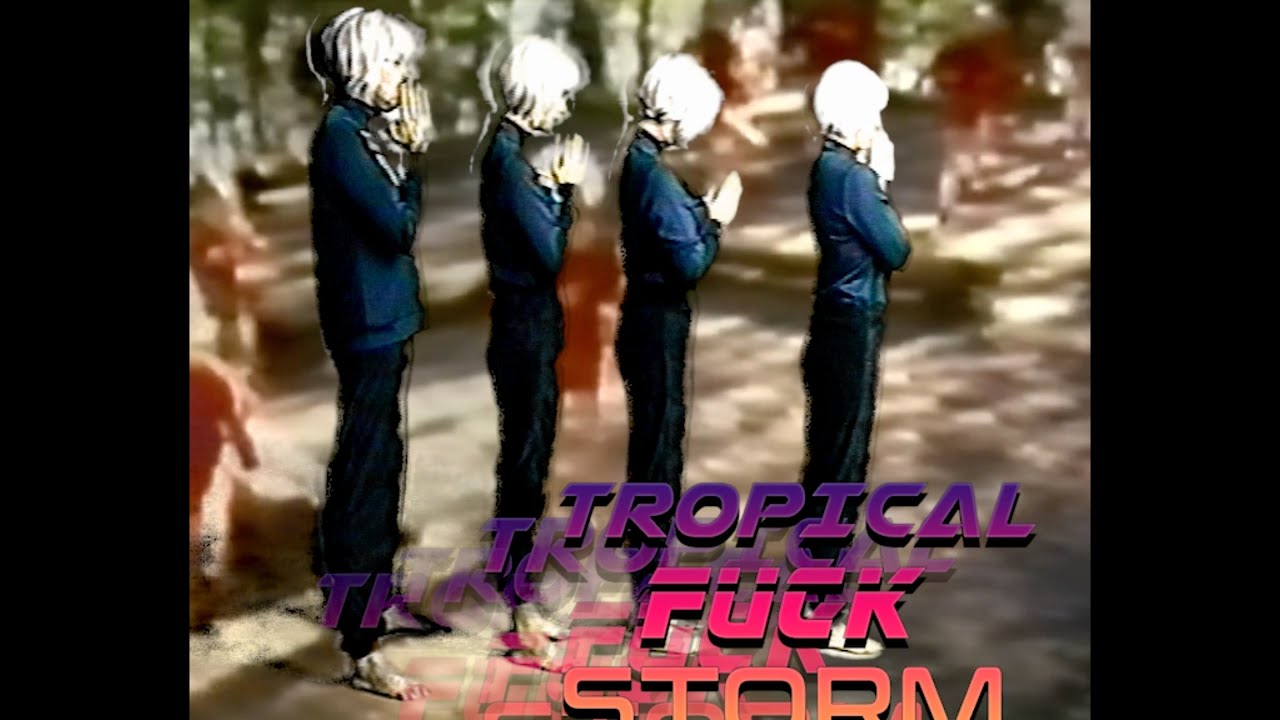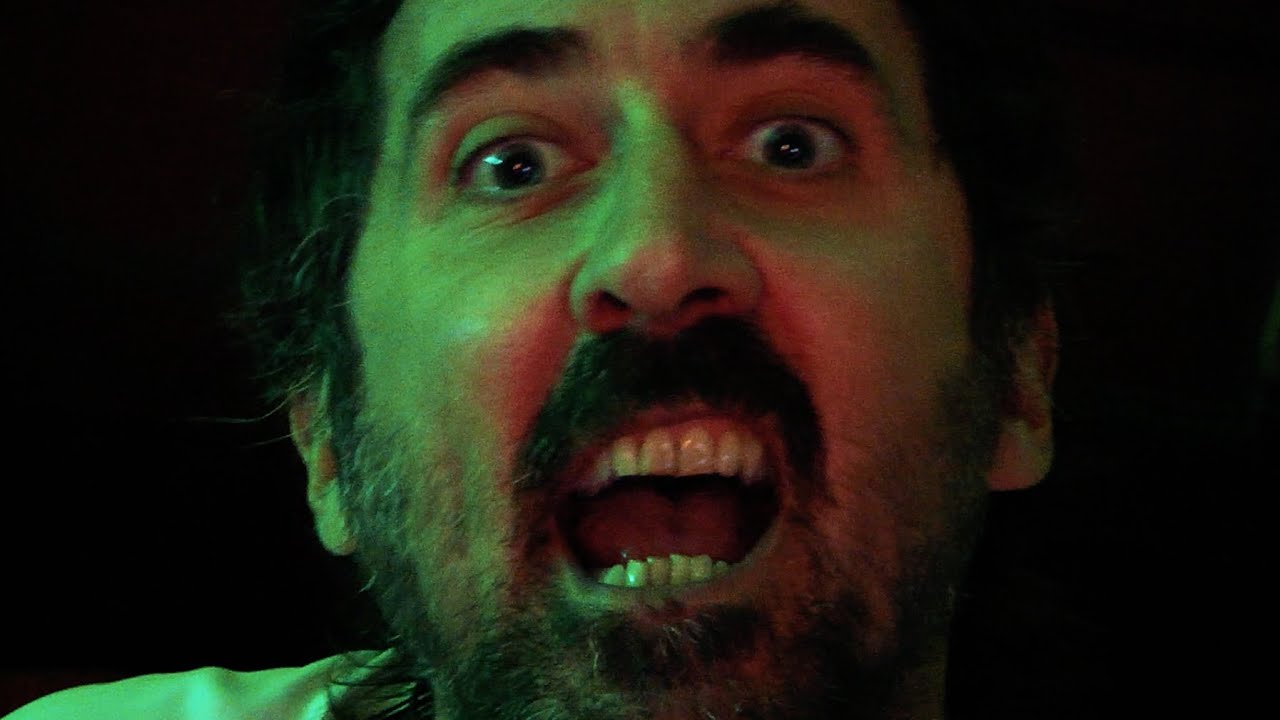Photos by Jamie Wdziekonski
“You only get one or two loves of your life, and you only get one or two apocalypses. I was hoping for something a bit more exciting than a fucking pandemic,” says Gareth Liddiard, reclining in his living room in the Australian countryside with a bottle of wine. “The Great Depression sounded like a drag, but at least you could jump on a train, drink booze and play guitar, and maybe kill a guy in a railyard somewhere. [Now] you can’t do anything. The house isn’t even getting bombed!”
The frontman of Tropical Fuck Storm is being flippant, of course. He’s prone to provocative statements. “We’ve been on tour and we’ve been caught up in riots, in Taksim Square in Istanbul we almost got shot,” he declares. “We’ve been to a drug-fucked part of Mexico and went on holiday in a place that was undergoing a full-blown cartel war. It was so frightening, but such a memorable holiday. It’s exciting!” His partner and bandmate Fiona Kitschin, who also played in their previous project The Drones, is more even headed. “It wasn’t exciting for me; I was terrified!” she laughs. “This was just the kind of apocalypse I was hoping for. Netflix, wine and pasta.” Later, after a diatribe about rock music’s refusal to depart from tired tropes, she explains with a chuckle, “Don’t mind him, he gets verbal diarrhoea when he’s hungover.” The two are treating the after-effects of yesterday’s music video shoot with the hair of the dog.
The energy Liddiard brings to an interview is the same as he brings to Tropical Fuck Storm’s songs, which exist at the extremes of humanity. New album Deep States, the band’s third, is populated by warring ‘Nazis and pinkos’, QAnon’s false prophet Q running a pig farm, grotesque Murdoch and Epstein-like figures, and a donkey left to perish on the shore while Noah’s ark sails off without her into the distance.
It is also far more collaborative than its predecessors, a universe made richer and more complex still thanks to the influence of Kitschin, drummer Lauren Hammel and guitarist-keyboardist Erica Dunn. ‘Suburbiopia’, which surrounds a basement-dwelling figure haunted by suicide cults and wondering if “maybe they were right”, is a setting imagined by Dunn and fleshed out lyrically by Liddiard, sung by Dunn and Kitschin. Where in the past Liddiard could be, by his own admission, “a control freak. I was so obnoxious,” on Deep States “I’ve learned to lighten the fuck up and let other people in on the process.”
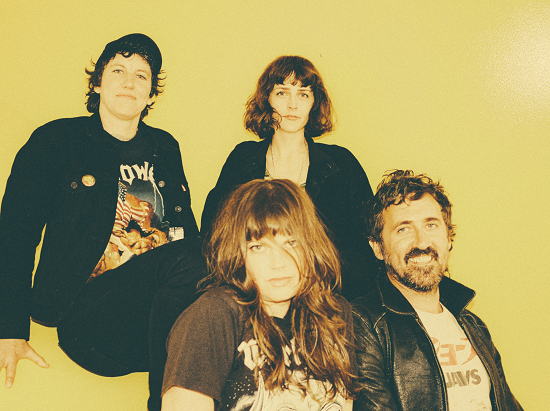
“I think it’s helped having women in the band,” Liddiard thinks aloud. Kitschin’s eyebrows raise. “Why do you think that is? Ego? A masculine thing?” she asks. “I have great male friends,” Liddiard says, “but we would only touch emotionally via a discussion about a carburettor. I grew up around women, and with a girl you get down to fucking business and talk about emotions. And they’re better at giving you a quick bollocksing if you’re being overarching and controlling. I absorb the shock and the shame a lot better when it comes from women.”
Liddiard and Kitschin live together in the tiny rural town of Nagambie, while Hammel and Dunn live in Melbourne, 90 minutes’ drive away. When Australia went into lockdown with the coronavirus outbreak last year, harsh restrictions on metropolitan Melbourne were dubbed the ring of steel, banning anyone from leaving. It sucked all motivation out of the band; a low-key isolation project just didn’t appeal. “I remember Miles Davis talking about Billie Holiday when she got out of prison. He was like, ‘Let’s go play a fucking gig’, and she’s like, ‘I haven’t sung for 18 months.’ He asks, ‘Why not?’ and she’s like, ‘Because I didn’t fucking feel like it!’” Liddiard says. During lockdown, “life’s purpose just went away. It took ages to claw it back.”
Eventually, as the virus subsided for a time, Hammel and Dunn were able to join them out in the countryside, visiting three days a week to record for about five months. “It was fun,” remembers Liddiard, “but the pandemic had just taken the zing and the zest out of everything. We were fighting against that feeling of being in the doldrums.” Forever on the road pre-COVID, rushing from one show to the next, “it was quick, quick, quick, always super hard work, but there’s a reason, a rocket up our arse. The rocket up our arse wasn’t there this time. But we managed to get it done.”
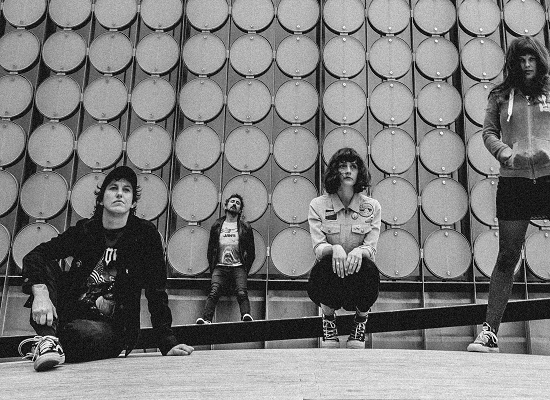
Though it took a while to get going, they ended up with a record that is an accurate reflection of those circumstances, capturing the last 18 months in all their weirdness, claustrophobia, confusion and terror. Often they dive head-first into the pandemic, such as on ‘Bummer Sanga’, where they capture a churning combination of outright dread, mistrust, cabin fever and utter boredom. “They usually work me like a borrowed nag / But leisure panic’s got me on the bags.”
Just as human society was already on the brink before the pandemic, however, this is a continuation of Tropical Fuck Storm’s established modus operandi. On their first two records, A Laughing Death In Meatspace and Braindrops, they were constantly embarking down rabbit holes – Gary Kasparov’s chess match against ‘Deep Blue’ as a grim warning about automation on ‘The Future Of History’, a love song from Brian Wilson to his crooked psychiatrist Eugene Landy on ‘Who’s My Eugene?’, an account of fictional Nazi telepath Maria Orsic being pursued and assassinated by a Mossad agent on ‘Maria 63’. “Every song becomes some sort of universe, or at least some sort of country, and it’s populated by ideas that have come before [on previous Tropical Fuck Storm songs], but I don’t track it like you’d track a map of a suburb,” Liddiard says. “It’s a dream-state. It has that kind of dream logic where you’re not exactly sure where things come from, ‘Why am I feeling this way or that way?’” Consciously or subconsciously he echoes a lyric he sang on The Drones’ ‘Private Execution’. “I think the best songs are like bad dreams, if you cover all the exits and don’t let the ideas escape.”
Dreamlike they might be, but Tropical Fuck Storm’s music is still rooted in the nightmare of real life. However extreme the figures that populate their songs, they are figures that walk among us with increasing visibility; the Trump-inspired militias that attacked the US Capitol in January, for example. “There ain’t no end of days/ this ain’t the Middle Ages/ There’s no grails, there’s no safe bets/ what you see’s what you get,” Liddiard warns on opener ‘The Greatest Story Ever Told’. As a songwriter, he’s fixated on what’s around him, and dismissive of those who rely on tried and tested rock traditions, “these dickhead males with beards who just wanna sound like Ryan fucking Adams,” as he calls them. “When you’re doing the Ryan Adams thing it’s just a costume, a bunch of tropes. You can’t talk about Twitter, you can’t talk about Jeff Bezos being a selfish cunt, you have to talk about trains, bourbon and chicks. But I don’t give a fuck about that, the same way that Chuck D didn’t give a fuck about that. You can hear his frustration, ‘Why isn’t anyone talking about this?’ You can do that and make it sound cool. It can be clunky, unwieldy, all that stuff, but so was Bob Dylan, he was clunky as fuck. Just believe in yourself, back it, and say what everyone else wants you to say, because people do want you to talk about that shit.”
You might argue that current reality, with its fractured lines between fact and fiction supercharged by post-truth politicians and media, is simply too overwhelming for most rock musicians to properly tackle. It’s a mark of Tropical Fuck Storm’s boldness that on the album’s lead single ‘G.A.F.F.’, which stands for ‘Give A Fuck Fatigue’, they tackle that very feeling of intense confusion head on. "Deep fakes, false flags, fires and famine/ Unicorns, uniforms, water cannons/ Everybody’s going nuts, their drugs are on drugs" Liddiard spits, desperation in his voice, over fractured riffs and a headache beat. You could call it misanthropy, but Kitschin argues that it’s the opposite. “It’s about being overwhelmed by all this information, all this extreme feeling, being so upset about all this terrible shit that’s going on in the world but then fatigued by feeling so much, giving a fuck about so many things because we’re given all this information abut the horrible shit that’s going on in the world,” she says. “It’s actually the opposite [of misanthropic]. It’s caring too much and getting overwhelmed.”
“You’re obliged to have a fucking opinion on everything,” adds Liddiard. “There’s so many fucking questions every single day. I care about those things, and I hope everyone gets a fair deal, but fuck, you turn on the internet on and it’s like ‘bleurgh’. Do I have to care about everything? Do I have to have a response?” At one point on the song, in one breath Liddiard rails against radicals at both ends of the spectrum: “Nazis hate Pinkos hate MAGAts in the park” he sings. “One side is going crazy ‘bout the way you look/ and the other side does it for looks." Liddiard explains: "If it’s anti-anybody it would be the extremes. The extreme right, the extreme left, they seem to give each other life.” For the most part, the band’s detractors and online trolls are on the far-right, but there are those on the far-left who take umbrage with them too. “The other day someone accused me of being a centrist,” Liddiard says. “What the fuck!”
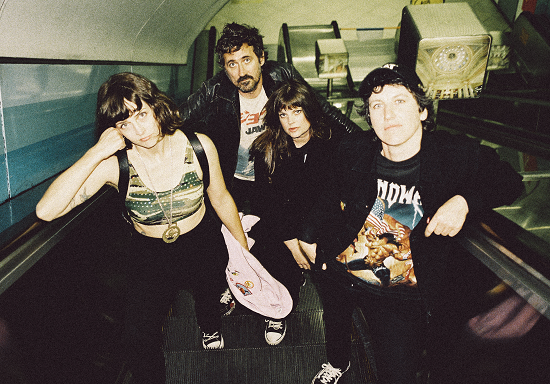
Where, then, would they place themselves on the political spectrum? “I mean, of course we’re lefties!” says Kitschin. “And socialists!” adds Liddiard defiantly. He supports movements for social change without a second thought. “I think that overreach is just a by-product of a healthy swing. There’s always going to be fringe elements,” he says. “The overreach has to happen to get people to pay attention,” says Kitschin. Conflating the far-left and far-right could be seen to have problematic implications, however. You might accuse Liddiard of the same kind of thinking that sees commentators viewing fascism and the people resisting it as being ‘just as bad’ as one another. There are plenty of contradictions to be found and holes to be poked in some of his logic, yet this, he argues, is simply the way people are. “Bill Burr, the comedian, said in this thing we watched the other day, ‘I defy anyone, woke, confederate flag-wielding neo-Nazi cunt at the January 6 insurrection, I defy anyone to write down everything they think and tweet it on Saturday and still have a job on Monday.’”
He reserves particular ire for the social media platforms whose algorithms are geared towards rewarding those who can cause the most outrage, and where, he believes, people are held to impossibly high standards, the kind that limit other artists from properly engaging with the world around them and lead them to instead fall back on those safe, boring tropes. “I have a lot of musician friends who self-censor because they don’t want to get into that minefield where you could be singled out, taken out of context and destroyed. So yeah, inevitably you end up singing about whiskey and trains.” He is resolutely unafraid of such consequences for himself. “I’m not saying any mad, evil shit, I just write what I think!” he says. “And everyone can fuck off because I don’t care! I just never have! Beethoven didn’t care, Bob Dylan didn’t care, Robert Johnson didn’t care, Shostakovich didn’t care. Diamanda Galas doesn’t give a fat flying fuck what you think.”
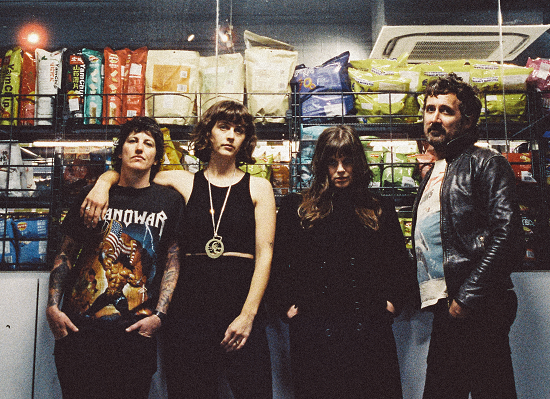
If there is a real villain on Deep States, it’s neither the extreme right nor left, but rather the billionaires whose social media platforms profit directly off division. “The dickhead who runs fuckin’ Twitter and the dickhead who runs fuckin’ Facebook would like to think they’re better than Rupert Murdoch, a bit more uppity, but they’re tabloid as fuck,” Liddiard continues. “At least Rupert Murdoch bankrolled The Simpsons, the most left-wing pop culture in history. Mark Zuckerberg didn’t do shit except rate chicks on their looks and turn all our dads into fucking Nazis.”
On ‘Bummer Sanga’, it’s clear that the paranoia, inertia and dread of the pandemic just doesn’t affect those higher-ups: the narrator sees a TV commercial offering glamorous trips to unfathomably beautiful resorts in outer space as a way around Earthly travel restriction. ”Why waste time?” says the advert. “I’m glad you asked,” the narrator replies. “My credit’s in a hole, I’m on the fucking dole, I’m running low on C.R.E.A.M, I’ve joined the State Surf Team.” For what it’s worth, Kitschin pushed for a happy ending, “One where we all go to a wonderful alien planet and have a tropical holiday forever. Why can’t we have a happy ending for once?” There is a little respite, at least of some sort, on ‘Reportings Of A Failed Campaign’, where the interweaving squabbles, scams, blackmailing and illegal dealings of the ultra-rich finally come crashing down in a bloody Shakespearean tragedy, each of them betraying one another until they’re all dead, destitute or exiled. “It’s almost a revenge fantasy. A bit of fantasy about them getting their comeuppance,” says Liddiard.
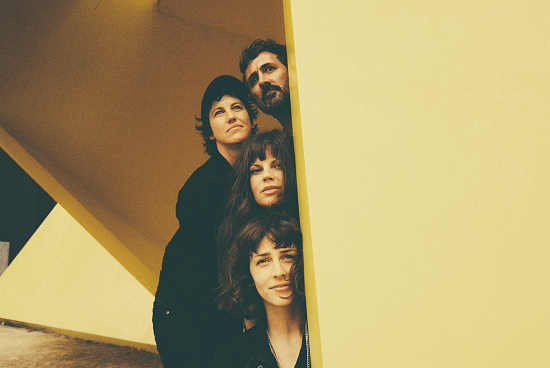
Deep States is an intense album, freewheeling from one image to another, yet its most affecting moment of all is its most tender. ‘Legal Ghosts’, the final track on the album aside from the brief abstract snippet ‘The Confinement Of The Quarks’, is a melancholy and drifting track, Liddiard’s singing laced with pain. "You know, I know that you know/ You are a legal ghost,” he repeats. It’s a song he wrote about a former girlfriend, who he knew when he was in his early 20s. The girlfriend’s own former partner had taken his own life by jumping in front of a train, and she had ended up embroiled in complex legal issues surrounding custody of his child in the aftermath – his legal ghost – while also struggling with heavy drug addiction. “We were living in Freemantle, just down from Perth,” Liddiard remembers. “Then she died. She killed herself in my car, and I just had to deal with that. The legal ghosts. It’s like, she was dead before she was dead. There was no way around it. But yeah, that’s what happened to me while everyone else was running around taking MDMA and going to raves. I was doing that shit!” This has always been a part of their universe too, in many ways the track is an extension of ‘Aspirin’ from their last record Braindrops, where Liddiard also confronts the loss: “I get something in the post and it is your legal ghost, and it just goes to show you’re kinda hard to leave behind.”
‘Legal Ghosts’ was first written over two decades ago. “It was the first decent song I ever wrote,” Liddiard says. “It was like an aeroplane that gets its wheels off the ground. My aeroplane had only ever just coasted down the runway and either stopped or crashed into the trees.” It was revived after he and The Drones guitarist Rui Pereira included a scrappy, psychedelic demo of it on a collection of their early pre-band material Bong Odyssey last year. The Tropical Fuck Storm version, sprawling and cathartic, is a song that in its devastating subject matter lays bare the heart at the core of Tropical Fuck Storm’s tornado of a sound. “There’s a joy in the humanity of the heaviness, like we’re joining with humanity,” says Kitschin. “When we’re recording, we’re literally having a wonderful time. There’s a weird juxtaposition between what the music can sound like and our personalities.”
In Tropical Fuck Storm’s determination to engage as fully as possible with the reality of human existence, in all its ugliness and contradictions, they are tapping into its truths. “It’s playful, it’s sexy, it’s happy, it’s loving, it’s positive,” Liddiard says of their music. “Even though it’s acknowledging…” “…that it’s painful as well,” Kitschin takes over. “The pain of life.” The results might be uncompromising, but they’re soulful too. “My favourite band of all time is Einstürzende Neubauten,” says Liddiard, showing the large tattoo of their logo on his inner forearm. “They just do the most fucked up, out there shit, but it’s got as much soul as Marvin Gaye.”
Tropical Fuck Storm’s new album Deep States is released on August 20 via Joyful Noise


